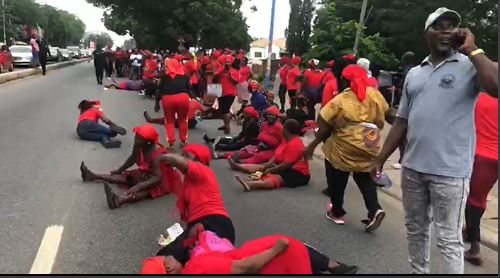The streets of Accra reverberated with the collective voice of discontent on Tuesday, September 16, 2025, as traders and transport operators from the CMB enclave staged a massive demonstration to protest against what they perceive as an unlawful land grab by private developers. Their livelihoods intertwined with the fate of the CMB lorry station, these individuals, representing diverse groups including the Ghana Private Road Transport Union (GPRTU), the Concerned Drivers Association, the Commercial Transport Operators, and the Container Owners Association, mobilized their ranks and marched from the Ridge Roundabout towards the Jubilee House, the seat of the Presidency, to deliver a petition outlining their grievances and demanding immediate intervention. The demonstration underscores the escalating tension surrounding land ownership and development in the bustling commercial hub of Accra, highlighting the precarious position of those whose daily existence relies on the continued operation of the lorry station.
At the heart of the protest lies the allegation that private developers, emboldened by unclear land titles or exploiting regulatory loopholes, are progressively encroaching upon the land designated for the CMB lorry station. This alleged encroachment, according to union leaders, has already resulted in the displacement of numerous drivers and traders who depend on the station for their income and survival. The demonstrators contend that the gradual erosion of the lorry station’s boundaries is not only threatening their livelihoods but also contributing to a broader urban crisis. As displaced traders are forced to ply their wares on the streets, traffic congestion intensifies, pedestrian safety is compromised, and the overall organization of commercial activity in the area deteriorates. The demonstrators paint a grim picture of a vital transport hub being systematically dismantled, leading to economic hardship and exacerbating existing urban challenges.
The demonstrators’ choice to march to the Jubilee House and present their petition directly to the Presidency underscores their belief that only the highest authority in the land can effectively address their concerns and halt the alleged land grab. They argue that previous appeals to lower-level authorities have gone unheeded, leaving them with no recourse but to seek presidential intervention. Their petition likely details the specifics of the encroachment, identifies the parties involved, and outlines the detrimental consequences of the ongoing land dispute. It likely also calls for a thorough investigation into the matter, the protection of the lorry station’s boundaries, and measures to compensate those who have already been displaced. The demonstrators’ plea to the President represents a desperate attempt to safeguard their livelihoods and preserve a vital component of Accra’s transport infrastructure.
The ongoing dispute over the CMB lorry station highlights the broader challenges facing urban areas in Ghana, where rapid development often clashes with the needs of established communities and informal economic sectors. Land ownership disputes are not uncommon, and the lack of clear land titles and effective regulatory frameworks can create opportunities for exploitation and displacement. The demonstrators’ concerns extend beyond the immediate threat to their livelihoods; they represent a wider anxiety about the social and economic consequences of unchecked development. Their protest calls attention to the need for more transparent and equitable land management practices that prioritize the needs of all stakeholders, not just those with the resources to navigate complex legal and bureaucratic processes.
The CMB lorry station plays a crucial role in Accra’s transport network, serving as a hub for both intra-city and inter-city transportation. It connects various parts of the city and facilitates the movement of goods and people, contributing significantly to the economic vitality of the capital. The station also provides employment opportunities for a large number of drivers, conductors, traders, and other support staff, forming a vital part of the informal economy. The potential loss of this crucial transport hub would have far-reaching implications, disrupting established transport routes, increasing travel times, and further congesting already crowded city streets. Moreover, the displacement of traders and other businesses operating within the station would exacerbate economic hardship and potentially contribute to social unrest.
The demonstration by traders and transport operators at the CMB lorry station serves as a stark reminder of the complex interplay between development, land rights, and livelihood security in rapidly urbanizing environments. The demonstrators’ appeal to the Presidency underscores the urgent need for government intervention to address the alleged land grab, protect the livelihoods of those who depend on the lorry station, and ensure that development projects are implemented in a manner that benefits all stakeholders. The outcome of this dispute will have significant implications for the future of the CMB enclave and could serve as a precedent for how similar land disputes are handled in other parts of the country. The government’s response will be closely watched by all those concerned about the equitable and sustainable development of Ghana’s urban centers.














